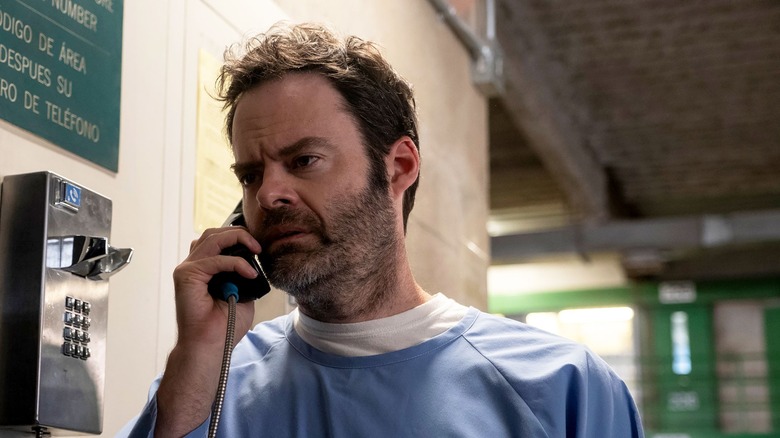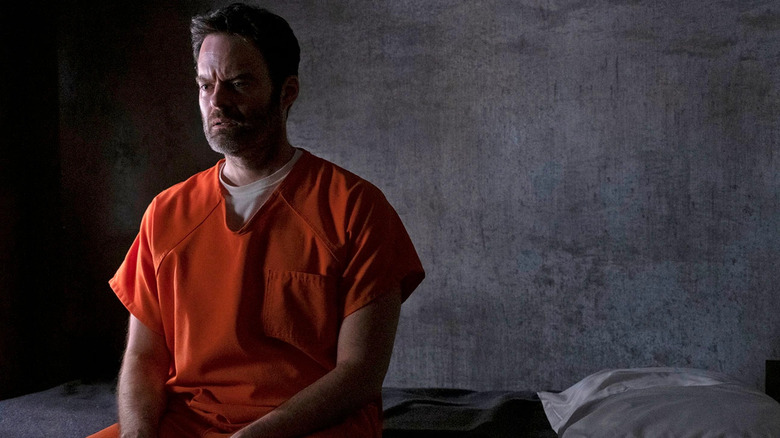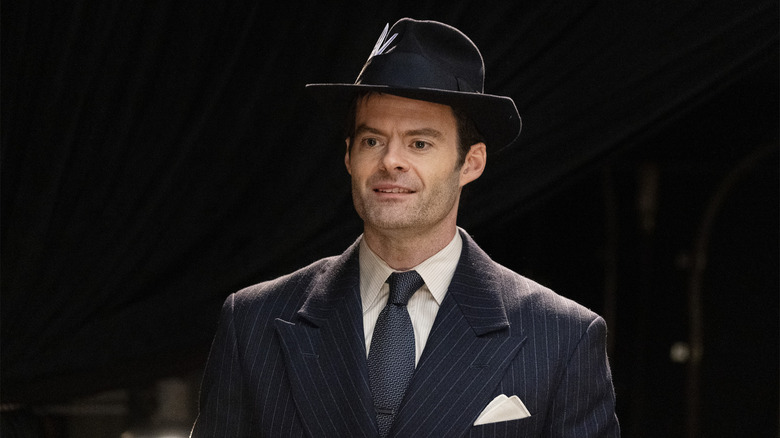Barry Season 4 Is, Somehow, Less Stressful Than Season 3
This piece contains spoilers for the season 4 premiere of "Barry."
Of all the half-hour shows out there that call themselves comedies, "Barry" is probably stretching it the most. Sure, it's a show with a lot of funny, goofy moments, but even back in season 1 it went to some incredibly disturbing places. Once Barry kills his friend in cold blood in season 1's penultimate episode, it's clear that the "dark" in the show's "dark comedy" label is doing a lot of legwork, and things only get bleaker from there.
Season 2 features Barry's total descent into the dark side, as well as a hard-hitting subplot about Sally and her abusive ex-husband. Season 3 ramps things up further by forcing Barry to face the family members of the many victims of his past crimes, while Sally (Sarah Goldberg) self-destructs just as she's got her foot in the show-business door. Even Hank (Anthony Carrigan), the show's go-to comic relief character, ends up in a terrifying storyline where his boyfriend's taken from him and forced through violent conversion therapy. In the season finale, Hank is trapped inside a cell where he listens to prisoners getting brutally mauled by a panther in the neighboring room.
As the fourth and final season moves to go out with a bang, the trend seemed clear: "Barry" would get increasingly dark as it went on. It would be like "The Sopranos" or "Breaking Bad," shows that are basically all about the gradual decay of their main characters' souls. As Barry's odds of redemption grow thinner, the color grading gets grayer and the jokes get fewer and farther between. But although season 4 does get darker, the growing anxiety of the first three seasons seems to have been dialed back.
There's comfort in hitting rock bottom
At first glance, season 4 certainly seems bleaker: Barry and Fuches (Stephen Root) are now in prison, and Sally's career is seemingly ruined. Barry in particular starts off as lost and broken as we've ever seen him, having now burnt his bridges with both Cousineau (Henry Winkler) and Sally, the only two people in his life capable of keeping him relatively grounded.
Yet even as we watch Barry get beaten up by a prison guard, or as Sally gets emotionally abused by her mother, there's still a slight sense of relief pervading their scenes. Things are as bad as they've ever been for both of these characters, but for the first time, they can't get any worse. It's reminiscent of that line in "American Gods," where the main character reflects on the calmness of being in prison: "He didn't worry that the man was going to get him, because the man had already got him," the book goes. "He was no longer scared of what tomorrow might bring, because yesterday had brought it."
For the first time in the show's history, we're no longer stressing ourselves out over the possibility of Barry getting caught, just as we don't have to worry about what'll happen if Sally ruins her reputation. There's still a lot of tension within the question of, "how will they handle these major setbacks?" But it's a different, less stressful tension than the questions the show's previously dealt with.
Is a happy ending possible? Kind of.
Most narratives have an act two low point, where all hope seems lost before the main characters pick themselves up and triumph despite the odds. It's hard to tell if "Barry" will go down the same road, however, because its characters' morally duplicitous natures have called the very definition of a happy ending into question. In a sense, Barry getting thrown in prison for the rest of his life is a happy ending, because it means the families of his hundreds of victims have finally gotten some semblance of justice.
But we still like Barry, murders and all, so we certainly don't want his life to be all gloom and doom going forward. And already by the second episode, Barry seems to be picking himself up and trudging on. He makes a deal with the FBI, he gets to talk to Sally honestly for the first time ever, and he's no longer banging his head into walls as often. Barry's pursuit of an acting career seems as sure to fail as ever, but at least this time we're not waiting for the walls to close in on him. The rug can only be fully pulled out from under you once.
"Barry" is still a dark show, and season 4 is arguably its darkest one yet, but it's also got a sense of hope to it the show hasn't really had since Cousineau found out about Barry murdering his girlfriend. For the first time in a while, it seems like things might actually get better for most of the major characters, and maybe that feeling is exactly what this show needs.
"Barry" airs on HBO and HBO Max on Sundays at 10 p.m. ET.


